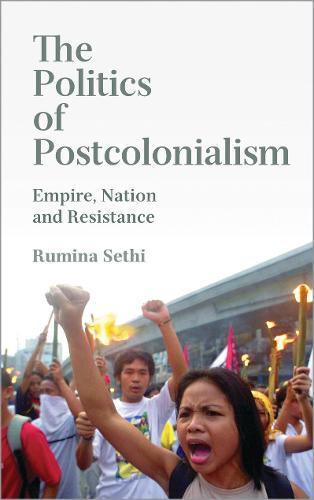Overview
In a period of vast global restructuring, unrestricted capital has eroded the traditional distinctions between nations and nationhood. In The Politics of Postcolonialism, Rumina Sethi devises a new form of postcolonial studies that makes sense of these dramatic changes. Returning to the origins of the discipline, Sethi identifies it as a tool for political protest and activism among people of the third world. Using a sophisticated mix of spatial theory and local politics, she examines the uneven terrain of contemporary anti-capitalism and political upsurges in Africa, Asia and Latin America, emphasising postcolonial politics, dissent and resistance. Her analysis shows that as the traditional means of direct political control have largely lost their hold, postcolonial cultures, now dominated by neoliberalism, are seeking fresh ways to express their discontent. This original and persuasive work frees the discipline from its current preoccupation with hybridity and multiculturalism, giving students of politics, cultural studies and international relations a new perspective on postcolonialism.
Full Product Details
Author: Rumina Sethi
Publisher: Pluto Press
Imprint: Pluto Press
Dimensions:
Width: 13.50cm
, Height: 0.80cm
, Length: 21.50cm
Weight: 0.235kg
ISBN: 9780745323633
ISBN 10: 0745323634
Pages: 192
Publication Date: 08 April 2011
Audience:
College/higher education
,
Professional and scholarly
,
Undergraduate
,
Postgraduate, Research & Scholarly
Format: Paperback
Publisher's Status: Out of Stock Indefinitely
Availability: In Print

Limited stock is available. It will be ordered for you and shipped pending supplier's limited stock.
Reviews
An excellent book... the author provides a concise and coherent account of postcolonialism and its relevance to contemporary debates without falling into the all too common trap of overly complicated accounts that fail to provide direction and nuances. -- Dr Gurchathen Sanghera, Lecturer in International Relations, University of St Andrews 'Her critical analysis of the 'politics of postcolonialism' and the lack of constructive dialogue with the Marxist perspective, interweaving with analysis of globalisation and the state of 'postcoloniality,' seeks to overcome the academic ossification of concepts that should be integrated with social change and activism' -- Noam Chomsky 'This book develops an argument that is both even-handed and radical. Rumina Sethi explores the history and the difficulties of post-colonial theory and without jettisoning its value she urges quite fresh thinking about its political and social implications' -- Dame Gillian Beer, King Edward VII Professor Emeritus at the University of Cambridge 'Challenges postcolonial critics to put their feet back on the ground and to link the postcolonial once again to the political activism by which it has always been inspired' -- Robert J.C. Young, Julius Silver Professor of English & Comparative Literature at New York University
This book develops an argument that is both even-handed and radical. Rumina Sethi explores the history and the difficulties of post-colonial theory and without jettisoning its value she urges quite fresh thinking about its political and social implications. --Dame Gillian Beer, King Edward VII Professor Emeritus at the University of Cambridge] 'If postcolonial studies is to be relevant today, ' Rumina Sethi argues, 'it must become the voice of the people and theorize about movements against globalization, not become part of its grand design.' Her critical analysis of the 'politics of postcolonialism' and the lack of constructive dialogue with the Marxist perspective, interweaving with analysis of globalization and the state of 'postcoloniality, ' seeks to overcome the academic ossification of concepts that should be integrated with social change and activism. --Noam Chomsky
'Challenges postcolonial critics to put their feet back on the ground and to link the postcolonial once again to the political activism by which it has always been inspired' -- Robert J.C. Young, Julius Silver Professor of English & Comparative Literature at New York University 'This book develops an argument that is both even-handed and radical. Rumina Sethi explores the history and the difficulties of post-colonial theory and without jettisoning its value she urges quite fresh thinking about its political and social implications' -- Dame Gillian Beer, King Edward VII Professor Emeritus at the University of Cambridge 'Her critical analysis of the 'politics of postcolonialism' and the lack of constructive dialogue with the Marxist perspective, interweaving with analysis of globalisation and the state of 'postcoloniality,' seeks to overcome the academic ossification of concepts that should be integrated with social change and activism' -- Noam Chomsky An excellent book... the author provides a concise and coherent account of postcolonialism and its relevance to contemporary debates without falling into the all too common trap of overly complicated accounts that fail to provide direction and nuances. -- Dr Gurchathen Sanghera, Lecturer in International Relations, University of St Andrews
Author Information
Rumina Sethi is a Professor in the department of English and Cultural Studies at Panjab University, Chandigarh, India. She is the author of The Politics of Postcolonialism (Pluto, 2011). She was awarded the Rockefeller Foundation Fellowship in 2006.




